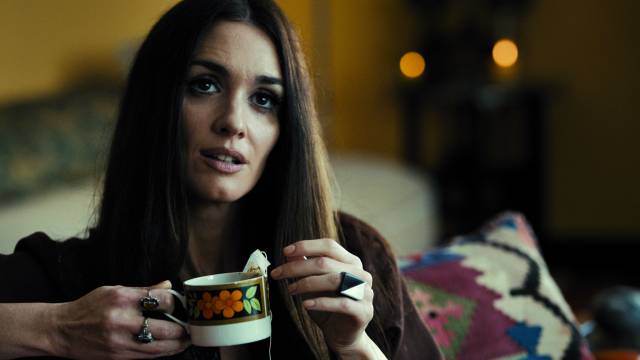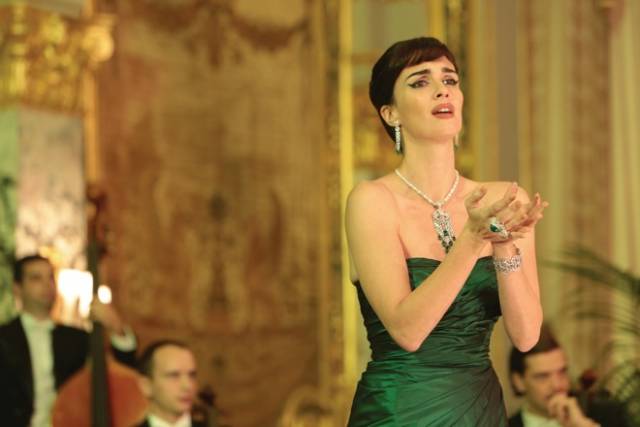

In Paulo Coelho’s Best Story Spanish actress Paz Vega plays Luiza, a sensual composite of several women who influenced the famous writer (played by Júlio Andrade) in his youth. Overpowering the screen with her magnetic charisma and star presence Vega plays Luiza as a woman incapable of hiding her emotions, she seems to live each and every moment intensely. Vega has brought this quality to several of her most famous parts including her breakthrough in Sex and Lucia and her touching work in James L. Brooks’ Spanglish. In 2015 she also appeared as Maria Callas in the Emmy-nominated Grace of Monaco opposite Nicole Kidman. On the occasion of the American premiere of Paulo Coelho’s Best Story, we had the pleasure of speaking to Ms. Vega who shared her insight on playing real life characters, the importance of imagination and offered tips about Spanish auteurs we should be on the lookout for.
Luiza is based on several women from Paulo Coelho’s life, which means she could’ve been a symbol or a narrative device. What was your work like in turning her into a human?
I treated each and every scene as a unique moment. Luiza is based on several women Paulo had affairs with as a young man before he met his wife, so they presented me with different moments he lived with different women, but my way of approaching the character was to play them out as if it was one person.
Were you intimidated about being in a film about one of the most popular writers in the world?
Yes, it intimidated me but at the same time it was a challenge. I am a fan of Coelho’s work and to be in a film about his life feels like a true privilege. It’s the second time I’ve worked with producer Iona de Macedo and when she called me to offer me the part I couldn’t say no.
In the film we see how people kept discouraging Paulo from a career as an author. Did you have a similar experience when you first said you wanted to become an actress?
I think this happens to many people who want to work in the arts. It doesn’t seem to be a “serious” job and you’re told you won’t make any money from it. My parents were very supportive when I told them I wanted to be an actress, because they saw how much it meant to me, but many kids who want to become artists often run against a wall because people want them to do “normal” jobs, as if being an artist is not normal. I remember some people asked me if I was insane and suggested I went to college instead, so I studied Drama and Journalism at the University of Sevilla, but on my sophomore year I decided to pursue acting in Madrid.
Whenever I’m reading a novel I tend to imagine film versions of what I read, does this happen to you as well? Do you imagine yourself as the characters?
Reading a book requires a lot of imagination, so I believe that reading and watching a film engage the brain in similar ways.
Do you want to direct your own films at some point?
I would like to do it at some point, directors have to take many decisions and have many people working under them so I haven’t felt the urge to do it yet, but I might some day. I do like writing though, so I’ll start with that (laughs)
Being familiar with how uneven worldwide film distribution is, can you tell us about the future Almodóvars and Amenábars? Filmmakers that haven’t broken out in the mainstream yet.
There are many new great directors, I like Alberto Rodríguez, a young Sevillian who directed Marshland. He’s one of many new directors who are making very interesting films, Spain is going through a wonderful creative time and it won't be long till you see these young directors in Hollywood.

Luiza is Paulo Coelho’s muse, who are Paz Vega’s muses?
My children. They are my inspiration, they are the people I love the most.
You recently shot All Roads Lead to Rome with Sarah Jessica Parker, and I need to ask if you were a big Sex and the City fan?
(Laughs) Well yes! Getting to meet Carrie Bradshaw was great! But also working with Sarah was a treat, we play rivals who eventually become friends and it was such a beautiful experience. She’s a terrific actress but she’s also a wonderful human being, a very hard worker, it was one of my most gratifying work experiences so far.
In Grace of Monaco you played Maria Callas, and while this is not the first time you’re playing a real life character since you’ve also played Saint Teresa and Mary Magdalene, it’s the first time that there were actually recordings and films of the person you’re playing. How did this affect your process?
Fulfilling people’s expectations is always very difficult even when you’re playing a supporting part like I did in this film. When I was offered the part I told the director I was a huge Maria Callas’ fan, I love her music, I love her as a woman, so having the opportunity to go under her skin felt like a true honor. There is so much of her out there, so all my preparation consisted of trying to get close to her, it was a beautiful journey.
I thought it was sad that Grace of Monaco became the center of a scandal over its distribution, because people didn’t get to see that it was actually a film with interesting ideas about the art of acting, do you think at some point people will forget about this and revisit the film?
I really hope so, the film offered a very personal vision from Olivier Dahan, it was an art film, it was different, and it surprised people because it wasn’t at all like what they were expecting from a biopic. Working in it was great, so I hope people can put their prejudices aside and watch the film without thinking about the scandals which were all about behind the scenes issues and had nothing to do with the artistic side.
Paulo Coelho’s Best Story will be available in theaters and on Amazon Instant Video on July 31. For more on Paz Vega visit her official site.